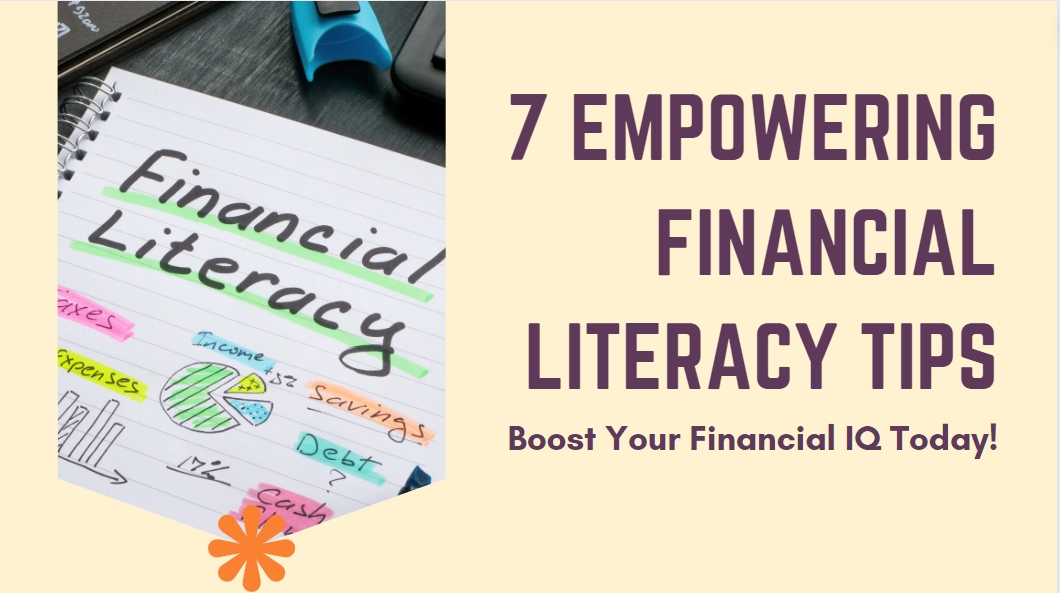Financial Literacy Tips 2024
Financial literacy is a crucial skill that empowers individuals to make informed decisions about their money. With the right knowledge and tools, you can take control of your finances and secure a prosperous future. In this article, we will explore seven financial literacy tips that are essential for adults aged 25 to 60 in 2024.
1. Understanding Personal Finance Basics
Personal finance basics are the foundation of financial literacy. They include budgeting, saving, and managing debt. Creating a budget is an essential step towards financial stability. By setting financial goals and tracking your income and expenses, you can manage your money effectively. Paying off high-interest debt and building an emergency fund are also crucial steps towards financial stability.
2. Building A Strong Credit Score
The second Financial Literacy Tips is that a strong credit score can help you secure loans, credit cards, and better interest rates. Paying bills on time, keeping credit card balances low, and checking your credit report regularly are key factors in building a strong credit score. A good credit score can save you thousands of dollars in interest over your lifetime, making it a crucial aspect of financial literacy.
3. Investing For The Future
The third Financial Literacy Tip is that Investing can help you grow your wealth and achieve financial independence. Understanding the basics of investing, such as stocks, bonds, and mutual funds, can help you make informed investment decisions. Diversifying your portfolio and regularly reviewing your investments can help you maximize your returns. Investing in a tax-advantaged retirement account, such as a 401(k) or IRA, can also help you build a substantial retirement fund.

4. Planning For Retirement
The fourth Financial Literacy Tips is Planning for retirement is essential for a secure financial future. Understanding the different types of retirement accounts, such as 401(k)s and IRAs, and contributing regularly can help you build a substantial retirement fund. Strategizing to minimize the impact of Required Minimum Distributions (RMDs) on your tax bill is also crucial for effective retirement planning. By planning for retirement early,you can ensure a comfortable and secure financial future.
5. Protecting Your Assets
The fifth Financial Literacy Tips is Protecting your assets, such as your home and car, is essential for financial stability. Understanding the different types of insurance, such as homeowners, auto, and life insurance, can help you protect your assets and manage risks. By having the right insurance coverage, you can avoid financial disasters and maintain your financial stability.
6. Staying Up-to-Date with Financial Trends
The sixth Financial Literacy Tips is Staying up-to-date with financial trends and news can help you make informed decisions about your money. Reading financial news, attending webinars, and following financial experts on social media can help you stay informed and educated. By staying informed, you can make better financial decisions and avoid financial mistakes.
7. Teaching Financial Literacy to Others
The seventh and last Financial Literacy Tips is Teaching financial literacy to others, such as your children or grandchildren, can help them build a strong financial foundation. Sharing your knowledge and experience can help others avoid financial mistakes and secure their financial future. By teaching financial literacy tips to others, you can make a positive impact on their lives and help build a financially literate society.
FAQs:
Q: What is financial literacy?
A: Financial literacy is the ability to understand and manage your money effectively.
Q: How can I start investing?
A: Start by understanding the basics of investing and creating a diversified portfolio.
Q: What are personal finance basics?
A: Personal finance basics include budgeting, saving, and managing debt.
Conclusion:
Financial literacy is a crucial skill for making informed decisions about your money and securing a prosperous financial future. By understanding personal finance basics, building a strong credit score, investing for the future, planning for retirement, protecting your assets, staying up-to-date with financial trends, and teaching financial literacy to others, you can achieve financial freedom.
You can also read our recent blog about: Investment Strategies For 2024 – Unlocking Financial Growth And Security

